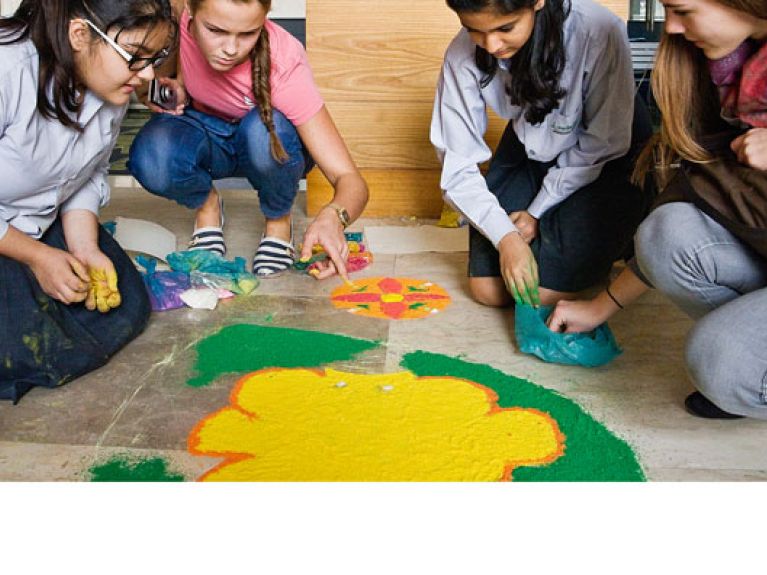The Indo-German Classroom
Students at German and Indian schools spend a whole year working on a joint project – and get to know each other’s culture in the process.

Does anyone know the English word for ‘Güllegrube’?” Stefanie asks her fellow students. “Güllegrube” is not exactly the sort of word the student from Straubing uses every day, but she needs the unusual term for the project work with her Indian classmate Chahat. After thinking for a moment, Stefanie resorts to pantomime, using both hands to indicate a deep hole while at the same time wrinkling her nose. Chahat looks at her, wide-eyed. But Stefanie doesn’t give up: she repeats the movements and wrinkles her nose again. Eventually, Chahat can’t help giggling, and Stefanie joins in. “Just try googling it!” Idris calls to the two girls from the table next to theirs. When the English translation appears on the computer screen, Chahat’s giggling turns into loud laughter: “Ah, manure pit. Okay.”
Stefanie, Chahat and Idris are members of the Indo-German Classroom. As part of the exchange programme developed by the Robert Bosch Foundation and Goethe- Institut/Max Mueller Bhavan in New Delhi, school classes from Germany and India spend a whole year doing research on a topic of their choice. The ten students from the Johannes Turmair High School in Straubing and the Lotus Valley School in Noida have chosen climate change as the topic for their project work. “Facing climate change: use of biomass in comparison to solar energy as parts of regional solution” is their project’s official title. In March 2013, the Indian students spent two weeks in the Bavarian city of Straubing, an experience Chahat can remember well: “It was all so green – and so quiet.” They worked together with their local German partner students, doing research on the potential of biogas. Now the Straubing high school students are spending two weeks in India. They kept in touch via an Internet platform.
Stefanie and Chahat are sitting in the computer lab on the first floor of Lotus Valley School in Noida, a suburb of the Indian capital New Delhi, doing research on biogas. Stefanie is explaining to Chahat how much electricity Germany already generates from alternative-energy sources. So far, India has largely met its electricity needs with fossil fuels, more than half of the country’s energy being generated from coal. Stefanie is using the example of Germany to try and illustrate to Chahat that nuclear power is not the only alternative to coal. Sixteen-year-old Patrick is sitting with Kartikey in the school library on the ground floor. The two boys are engaged in producing a poster that is subsequently to be put on display at the Lotus Valley School and the Johannes Turmair High School. They are formulating three key demands, addressed to the governments of their two countries, which need to be met if the problem of climate change is to be successfully tackled before it is too late. Here in India, it is particularly evident that urgent action is needed, says Patrick.
The previous day, the two of them had gone together to watch a Formula One race. “But you could hardly see for more than a hundred metres from the spectator stands,” says Patrick, because of the thick smog cover over New Delhi. Kartikey nods and lists recent weather-related events: floods in August, cyclones in September and smog in October – in India, the effects of climate change are more visible than in Germany. That’s why Kartikey agrees with his German exchange partner that urgent action needs to be taken. But when Patrick suggests that they make their own personal contribution by travelling to school on the school bus instead of by car the next morning, Kartikey rejects the idea. He believes it’s more important that the government first draw up environmental protection plans. Patrick shrugs his shoulders.
At that moment, Stephan Eckl enters the library. Together with his Indian colleague Deepika Awasthi, the high school teacher is in charge of the group of students participating in the Indo-German Classroom. “Climate protection is something really close to my heart,” says Eckl. And India not only has major environmental problems, he explains, it also boasts substantial resources for producing alternative energy. A great deal could be achieved with relatively little effort, says Eckl. For instance, the higher number of annual sunshine hours and the greater intensity of sunlight in India would enable it to produce solar power much more effectively than Germany. He said he had been particularly impressed by so-called low-cost biogas fermenters, simple brick-lined pits in which dung or vegetable waste is fermented. The gas this produces can be used directly for cooking. Eckl and his students were able to take a close-up look at stoves that use this technology during a visit to The Energy and Resources Institute (TERI) in Gurgaon.
During their two-week stay in India, the students from Straubing live with host families. They gain experience of India’s work and education culture, as well as visiting the nearby capital and the Taj Mahal. This way, the students not only benefit academically and get to know new ways of thinking and seeing things in Indian society, says Eckl. The exchange also has a formative influence on their personalities: “It helps the students to develop, in all aspects of their lives.”
Suddenly, the school bell rings. Lunch break. Patrick and Kartikey pack up their things and make their way to the cafeteria. Except during the main lunch break, eating is prohibited at Lotus Valley School – it would only keep the students from learning. That’s why Kartikey and Patrick are in a hurry. In the cafeteria, they meet the other students from the Indo-German Classroom. Lentils with rice is on the menu today. Patrick quickly helps himself to a large spoonful, then freezes. “It’s really spicy,” he groans, fanning his mouth with his hand. When Kartikey sees Patrick’s face flushing slightly, he laughs. At home, his mother cooks an especially mild portion for Patrick, says Kartikey. “India is simply different.”.▪
Michael Radunski

